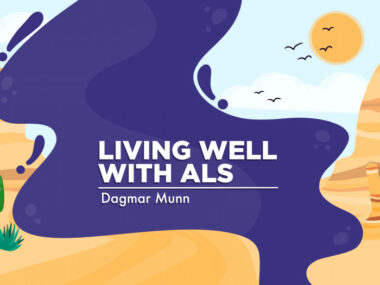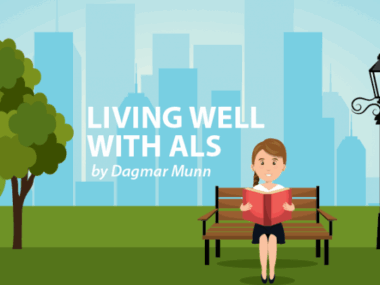Sorting out the sometimes confusing advice on ALS and diet
A recent analysis seems to encourage eating sweets, but another says not so fast
Written by |

What if I told you that eating sugar cookies and cherry pie could help slow down the progression of ALS symptoms? You’d probably say, “Hey Dagmar, you’ve gone bananas!” I know, I know. The suggestion sounds contrary to what we’ve always been told about healthy eating, especially for anyone who has ALS.
However, a recent analysis covered this month by ALS News Today reports that eating foods with a higher glycemic index was associated with slower functional declines and prolonged survival among people with ALS.
Whoa there! Deliberately eating foods that cause blood sugar levels to spike does seem backward and upside down. Nutritionists caution us to avoid overloading our diets with carbohydrate-rich foods because doing so carries the risk of diabetes and related complications.
However, the pathology of ALS continues to be a mystery to medical experts, so I’ve learned to keep my mind open to all possibilities.
Stepping on the scale
I discovered the roller coaster of dietary advice around my disease during my first ALS clinic visit 13 years ago. While stepping off the scale, I learned that ALS patients are encouraged to gain weight. “Eat whatever you want,” was the advice, with the explanation that being a few pounds overweight was associated with slower symptom progression and longer life when compared with being underweight.
Before my ALS, given my early gymnastics, dance activities, and professional career teaching fitness, you could say I spent most of my life in leotards and leggings. The scale was never my friend. So being told I was free to plump up a little was music to my ears!
However, a review of clinical trials this summer reported no evidence of a high-calorie diet affecting symptom progression. Oh, well, eating a lot was good while it lasted.
Yet a 2018 study found evidence that ALS is linked to hypermetabolism, meaning my muscles are burning energy at a faster rate and need high-carbohydrate calories. All right, now I’m back to having extra helpings!
Questionable dietary advice
Adding to the ALS dietary confusion are the various cure-all “experts” who make the rounds on social media. Some recommend consuming boatloads of vitamins and supplements while others highlight a patient who was “cured” and urge everyone to duplicate their diet regime.
When I read these claims, I’m reminded of my mother-in-law, who lived to be 104. Throughout her life, she shunned salads while extolling the benefits of Wiener schnitzel. On her 100th birthday, her nursing home celebrated with cake and invited local TV news reporters. When asked to what she attributed her long life, she looked straight into the camera, winked, and said, “Beer!”
Drinking beer and avoiding lettuce might not be the secret to a long life, but having a good attitude helps.
While we wait for an official “ALS diet,” we need to consider our individual health histories, our medications, and our body’s needs. Most important, we should discuss all of these issues with our medical team.
That’s the thing about ALS: There’s much we still don’t know about it. We just have to keep our minds open and keep up with the current news and research. Considering our diets and supplements is a good way to begin.
All in all, the news about eating high-glycemic foods sure makes holiday treats taste even better. I’m doing it to live well while living with ALS.
Note: ALS News Today is strictly a news and information website about the disease. It does not provide medical advice, diagnosis, or treatment. This content is not intended to be a substitute for professional medical advice, diagnosis, or treatment. Always seek the advice of your physician or other qualified health provider with any questions you may have regarding a medical condition. Never disregard professional medical advice or delay in seeking it because of something you have read on this website. The opinions expressed in this column are not those of ALS News Today or its parent company, Bionews, and are intended to spark discussion about issues pertaining to ALS.






Monica Meder O'Callaghan
Your mother-in-law's story reminds me of the book called "Blue Zones" which documents centenarians worldwide. The overall take away is they lead a life more at peace and with less stress. So if drinking a daily beer helps make for a more peaceful life, go for it. I was was diagnosed right after a very stressful period in my life, as well as having been given 2 Covid and a shingles vaccine within a short period of time.
Dagmar Munn
Thank you Monica, I'm not sure if the blue Zone folks drink beer and eat Wiener schnitzel and drink beer... but it is a nice thought ;-) As for the cause of ALS, the experts are still searching for it. Meanwhile we need to remember that "association should not be confused with causation." Best wishes to you. Dagmar
Gideon
Dear ALS patients
Last week a publication in Canada showed that sugar helps fight ALS
I have been giving my wife Raw New Zealand Manuka Honey. +100 2x tablespoon, with probiotic yogurt
Manuka Honey is known to reduce inflammation and help the muscles and probiotics help good bacteria in the stomach
If you want you can mix honey with Turmeric and let it stay on one day before Consuming
Dagmar Munn
Yogurt with fruit has a high glycemic index, so maybe yogurt with honey does as well. The probiotics in yogurt are beneficial (I have yogurt several times a week!). Seems we all have our personal nutrition combinations that work for us. Thank you for sharing yours. Dagmar
John Saltmarsh
Well I am in the 9th year living with ALS and quickly learned everyone living with ALS had a different journey. Initially I had a goal to maintain my weight, take medication as recommended but not to the physical detriment of my mobility, e.g. my muscles become stiff as I exercise, rather than increasing Baclofin, which is a general purpose muscle relaxer. Over the years with ALS I have had a number of issues each one I need to adapt.
Dagmar Munn
John, you are so right. ALS affects each person differently. My personal motto is Adapt-Learn-Survive https://alsandwellness.blogspot.com/2015/01/adapt-learn-survive.html
Best wishes to you. Dagmar